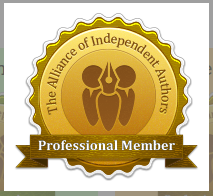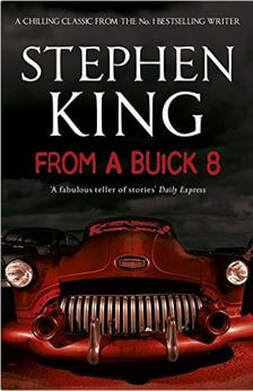 As many of you know, I love Stephen King's novels. I think he's a master of the writing craft, and I'm awed by his prolific output. I'm working my way through his books, a task that will keep me occupied for quite a while! On a recent trip to a charity shop, I bagged myself seven titles I'd not yet read. All were ones that aren't so well known, such as 'Desperation' and 'Just After Sunset'. I was curious about my purchases, wondering why they hadn't achieved the success of books such as 'Carrie' or 'The Shining'. The last one I finished was 'From a Buick 8', a novel about a supernatural car. The book gets very varied reviews on Amazon, and I can see why. For me, reading it proved a mixed experience. First, let's deal with the good stuff. The prose is every bit as enthralling as King's other novels. I love the way he makes magic with words, and 'From a Buick 8' didn't disappoint in that respect. I read the book pretty much in one sitting, and was never bored. After all, diehard fans like me will enjoy whatever the man writes, even if it's his laundry list! So what was the issue? How come I could understand the scathing Amazon reviews, ones such as, 'It should have been titled "nothing happened"'? Or what about: 'A car that isn't really a car pitches up in a Pennsylvania backwater... and that's it. What we don't get is a story.' Less leaves, more action, pleaseWhilst the words are wonderful, 'From a Buick 8' lacks a coherent plot or much tension. It's a shame because the potential's there, but King fails to develop it. One problem is that the story is largely revealed in hindsight, with the police officers of Troop D telling the story of the mysterious car they guard to a rookie recruit. Such a plot device lacks the immediacy present-day action offers, at least the way King does it. As those disgruntled reviewers pointed out, the plot is thin. The Buick could have been so much more menacing than it actually is. More victims should have succumbed to its power, thus upping the ante. Instead, Kind spends a lot of the book telling us how the car's trunk spawns all manner of weird things, most of which can't survive in our world. Instead of leaves that disintegrate minutes after they arrive on planet Earth, or dead flowers, how about giving the readers something truly scary? The one thing that does live is more ridiculous than frightening, and is soon killed anyway. It would have been good to have a chapter or two in which the state troopers attempt to destroy the car, resulting in casualties as it fights back, but it didn't happen. Instead we're given a flimsy reason as to why they're content to leave it be. Even the Troop D members admit long stretches of time pass during which nothing happens with the Buick. Neither are we given any notion as to why the car ended up in this world, abandoned by its mysterious driver. Again, I feel the author missed a trick here. This is not the stuff great supernatural fiction is made of, in my opinion. King does provide a welcome boost to the tension towards the end, but then the plot goes flat again. So there you have it. I'm still an avid fan of Stephen King's work, given his talent with words, but 'From a Buick 8' will most likely only appeal to readers who, like me, are already hooked. Let's hear from you! Have you read 'From a Buick 8'? What's your opinion of the book? Leave a comment and let me know!
1 Comment
Today I'd like to welcome novelist Rachel Amphlett to my blog. Originally from the UK, then based in Australia and now back on our shores, Rachel’s novels appeal to a worldwide audience, and have been compared to Robert Ludlum, Lee Child and Michael Crichton. Wow! Let's get going with the interview… Pick one of your novels in the Detective Kay Hunter series and tell us about it.Thanks for having me on your blog, Maggie. 'Will to Live' is the second in the series, and sees Kay Hunter pitted against a serial killer who’s been using a stretch of the local railway known as “Suicide Mile” to dispose of his victims – until a witness stumbles across one of his victims before the train strikes. Kay and her team then have to revisit a number of cold cases to try to establish a pattern, while the killer is still at large. On top of that, Kay’s investigation into who tried to destroy her career intensifies, with catastrophic consequences. You also write espionage novels. Which do you find the most challenging to write: crime or spy fiction? |
| Vladimir Nabokov was a Russian-American novelist. His most famous novel, written in English, is 'Lolita' (1955), notorious thanks to its controversial examination of an affair between a young girl and an older man. Nabokov had an avid interest in butterflies, which was what led to his exploration of the region, rather than a prurient interest in children (we hope!) The area is stunningly beautiful and includes Arizona, parts of New Mexico, Colorado, Utah, Texas, Nevada and California. As someone who has long wanted to drive across the southern USA, I'd love to follow in Nabokov's footsteps, although without the butterfly net! Monument Valley will be a 'must see' on my itinerary when I do so. Perhaps it's time to write a road trip novel? |
2. The French Riviera - Scott Fitzgerald
| F. Scott Fitzgerald and his family once rented a seaside villa in Cap d'Antibes, where he wrote his most famous novel, The Great Gatsby. The French Riviera is located in the south-east of France on the Mediterranean, and became popular during the eighteenth century as a winter vacationing spot for the British upper class. It has also played host to other famous writers such as Aldous Huxley, Somerset Maugham and Edith Wharton. I've not visited the French Riviera for many years, but I well remember the fabulous wealth of Monaco and the beauty of the scenery. France isn't on my immediate list of countries to visit, but it would be good to return one day and explore further, following in the footsteps of the famous novelists I've mentioned. |
3. The Florida Keys - Ernest Hemingway
| Ernest Hemingway is inextricably linked with the Florida Keys, in particular Key West, where he wrote To Have and Have Not. He also worked on the draft of A Farewell to Arms while living on the island. The drive from Miami through the Florida Keys is spectacular, and one I remember well, my destination being Key West with its relaxed atmosphere. When I was there in 1994 I visited Hemingway's house where he lived for eight years. As an avid animal lover, I was entranced by the cats there, all descendants of Hemingway's own felines and sporting six or seven toes rather than the usual five. The house itself contains much of interest and was one of the first on the island to benefit from modern plumbing and a swimming pool. |
4. Henry Miller - Paris
| Henry Miller was an American author who developed a new form of writing novels, penning semi-autobiographical books involving social criticism, philosophy and explicit sexual references and language. His best know works include Tropic of Cancer, Tropic of Capricorn and Black Spring. He lived in Paris between 1930 and 1939, which is where he wrote Tropic of Cancer, telling a friend he'd write it as 'first person, uncensored, formless'. Whilst there he became friends with the British author Lawrence Durrell and began his affair with Anaïs Nin. Paris is an easy trip for me, being a short hop on the Eurostar, and I was last there about twelve years ago. The city has been home to many famous writers, including Honoré de Balzac, Victor Hugo, George Sand, Marcel Proust, Simone de Beauvoir, and Jean-Paul Sartre. |
5. Cornwall, UK - Virginia Woolf
| I've not visited Cornwall since my teens, but seeing the BBC's recent adaption of Poldark reminded me how beautiful that part of the UK is. I also read 'The Fire Child' by S K Tremayne recently, which features the old Cornish tin mines along with photographs of them. The town's lovely coastal scenery, including Godrevy Lighthouse, may have been the inspiration behind Virginia Woolf's To the Lighthouse. Other authors, including Poldark's Winston Graham, have used Cornwall’s landmarks in their books. Mary Wesley's 'The Camomile Lawn' features Roseland House; the Headland was used in the film adaptation of Roald Dahl’s 'The Witches'. Daphne Du Maurier's books also rely heavily on Cornwall as their backdrop. Perhaps it's time I paid the county another visit - who knows, I might get inspired for a future novel! |
How I edit my novels - from first draft to completed manuscript

I've blogged before about different aspects of the writing process, including plotting and how I organise my working day. This week I'd like to focus on the editing cycle. As part of my contract with Lake Union, my first novel, 'His Kidnapper's Shoes', underwent revision prior to being republished by Amazon, and that proved a fascinating, as well as novel, experience!
When I started my writing journey, I lacked the funds for a professional editor. (They don't come cheap!) Instead, I did the best I could myself. Now I'm with Lake Union, all that's changed, because Amazon pick up the costs. Until now, my editing process has gone as follows. First, I set the manuscript aside for at least a month, so that when I return to it, I do so with a fresh eye. My first drafts are rough, because I prefer to get the story out of my head first and worry about sorting the mess later. In the early stages, I spend a lot of time moving text around, deleting some parts and adding others. Once I have a coherent second draft, I check for correct spelling, punctuation, etc.; I'm a stickler for that sort of thing! I always run my books through Microsoft Word's spelling and grammar check as well, though.
Another tool I use, and love, is Pro Writing Aid. There's a free version, but I use the premium one for its extra features, and have a lifetime subscription. Pro Writing Aid will tell me when I've used the same word too often in close proximity, check for clichés and redundancies, perform a grammar check, and much more.
The next step is to tighten and prune my prose. It's scary how many unnecessary words I find! Often I shed several thousand during this stage. By the time I've done all this, the novel is, with any luck, slimmer and fitter.
When I started my writing journey, I lacked the funds for a professional editor. (They don't come cheap!) Instead, I did the best I could myself. Now I'm with Lake Union, all that's changed, because Amazon pick up the costs. Until now, my editing process has gone as follows. First, I set the manuscript aside for at least a month, so that when I return to it, I do so with a fresh eye. My first drafts are rough, because I prefer to get the story out of my head first and worry about sorting the mess later. In the early stages, I spend a lot of time moving text around, deleting some parts and adding others. Once I have a coherent second draft, I check for correct spelling, punctuation, etc.; I'm a stickler for that sort of thing! I always run my books through Microsoft Word's spelling and grammar check as well, though.
Another tool I use, and love, is Pro Writing Aid. There's a free version, but I use the premium one for its extra features, and have a lifetime subscription. Pro Writing Aid will tell me when I've used the same word too often in close proximity, check for clichés and redundancies, perform a grammar check, and much more.
The next step is to tighten and prune my prose. It's scary how many unnecessary words I find! Often I shed several thousand during this stage. By the time I've done all this, the novel is, with any luck, slimmer and fitter.
Scrivener helps every step of the way
I also run each chapter through a checklist. Does it start with a bang? Will the ending lead the reader to the next chapter and create excitement? Have I included enough (but not too much) description and sensory details? Is the pacing right? I try to view it from a reader's point of view, which is hard for me, as I need to switch hats!
At the end of all this, I read the manuscript several times to make sure it's as good as I can make it. This is hard because I can waste lots of time tweaking tiny details - at some stage I need to release the book to my wonderful beta readers! I have several people who provide feedback on what they like and don't like, what works and what doesn't. I implement most of their advice; it's rare for me to reject anything they say. After all, they come to the novel with a fresh eye, whereas by this stage I'm usually jaded!
For me, editing is the longest part of the process, but unlike some writers, it's something I love doing. I find great satisfaction in polishing my first drafts (believe me, they really are rough!) into something better. I use Scrivener to organise every step of the way. Scrivener is software designed for writers, and has revolutionised my writing. If I could marry a piece of software, it would probably be this one!
At the end of all this, I read the manuscript several times to make sure it's as good as I can make it. This is hard because I can waste lots of time tweaking tiny details - at some stage I need to release the book to my wonderful beta readers! I have several people who provide feedback on what they like and don't like, what works and what doesn't. I implement most of their advice; it's rare for me to reject anything they say. After all, they come to the novel with a fresh eye, whereas by this stage I'm usually jaded!
For me, editing is the longest part of the process, but unlike some writers, it's something I love doing. I find great satisfaction in polishing my first drafts (believe me, they really are rough!) into something better. I use Scrivener to organise every step of the way. Scrivener is software designed for writers, and has revolutionised my writing. If I could marry a piece of software, it would probably be this one!
My experience with a professional editor
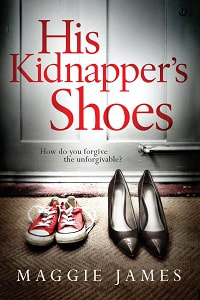
I'll continue to use this process I've outlined above, because it works well for me, but things worked differently for the two novels I've published with Lake Union. Here's how it's worked so far. Soon after I sent 'His Kidnapper's Shoes' to Sammia, my Amazon contact, she assigned Gillian Holmes as the book's editor. Gillian has over twenty years' experience in the industry and has worked with big names such as Kathy Reichs and Tony Parsons, so I was delighted!
First she emailed me her overall impressions of the book and her main recommendations, along with my manuscript containing her detailed notes. Next Sammia organised a conference call between the three of us. She wanted to ensure I understood the process before I got stuck in, and I appreciated her thoughtfulness. I did wonder what Gillian might want to see changed in the book, not because I'm arrogant and consider it perfect, but because I'm too close to it to be objective. All her recommendations made sense and echoed some of the less favourable reviews I've received. She asked me to tone down the sex and swearing, and make Daniel Bateman a more likeable character. With that in mind, I set to work.
I needed to learn Microsoft Word's 'track changes' feature but my inner geek enjoys stuff like that! It didn't take long to implement Gillian's recommendations. My experience of working with her has been very positive. Once I'd experienced the huge benefits of having a professional editor, I asked Gillian to edit my fiction titles that don't fall under my Amazon contract. I'm keen to make my novels as polished as possible, especially now I've joined the Alliance of Independent Authors, a professional writers' association.
First she emailed me her overall impressions of the book and her main recommendations, along with my manuscript containing her detailed notes. Next Sammia organised a conference call between the three of us. She wanted to ensure I understood the process before I got stuck in, and I appreciated her thoughtfulness. I did wonder what Gillian might want to see changed in the book, not because I'm arrogant and consider it perfect, but because I'm too close to it to be objective. All her recommendations made sense and echoed some of the less favourable reviews I've received. She asked me to tone down the sex and swearing, and make Daniel Bateman a more likeable character. With that in mind, I set to work.
I needed to learn Microsoft Word's 'track changes' feature but my inner geek enjoys stuff like that! It didn't take long to implement Gillian's recommendations. My experience of working with her has been very positive. Once I'd experienced the huge benefits of having a professional editor, I asked Gillian to edit my fiction titles that don't fall under my Amazon contract. I'm keen to make my novels as polished as possible, especially now I've joined the Alliance of Independent Authors, a professional writers' association.
Any questions?
I'm happy to answer any questions you have about how novelists (well, me - I can't answer for everyone) edit their books. Leave a comment and let me know!
In this week's post, I continue my 'Five' series, examining novels that proved highly controversial on their release. I'm a firm believer in adults being able to read whatever they choose. In my view, just because a book offends some people (usually because of sex or religion, those perennially divisive subjects!) it's no reason to deny it to others. The difficulty for this post was, of course, narrowing my selection down to five! Authors have frequently challenged prevailing social attitudes, giving me a deep pool from which to make my selection. Eventually I chose the following novels.
1. 'Brave New World' by Aldous Huxley
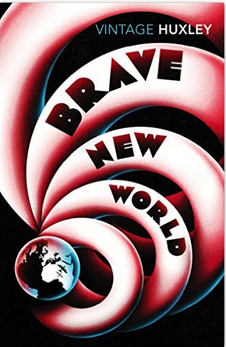
Aldous Huxley wrote 'Brave New World' in 1931, with publication taking place in 1932. From the start, the novel sparked controversy, being banned in Ireland on the grounds of offensive language and anti-religious themes. Not much has changed in the decades since, with the novel becoming one of the most hotly debated books in America. Readers have been infuriated by its sexually explicit scenes and bad language. It has also been banned in India due to its sexual content. As if that weren't enough, in 1982 Polish author Antoni Smuszkiewicz accused Huxley of plagiarism, citing two Polish novels written in the 1920s. According to him, their similarity to 'Brave New World' was so great that Huxley must have poached their plots. It's definitely a controversial book!
Here's a synopsis: Far in the future, the World Controllers have created the ideal society. Through clever use of genetic engineering, brainwashing and recreational sex and drugs all its members are happy consumers. Bernard Marx seems alone harbouring an ill-defined longing to break free. A visit to one of the few remaining Savage Reservations where the old, imperfect life still continues, may be the cure for his distress... Sounds fascinating! I can't believe I've not yet read this classic novel, so it's going on my list.
Here's a synopsis: Far in the future, the World Controllers have created the ideal society. Through clever use of genetic engineering, brainwashing and recreational sex and drugs all its members are happy consumers. Bernard Marx seems alone harbouring an ill-defined longing to break free. A visit to one of the few remaining Savage Reservations where the old, imperfect life still continues, may be the cure for his distress... Sounds fascinating! I can't believe I've not yet read this classic novel, so it's going on my list.
2. 'Ulysses' by James Joyce
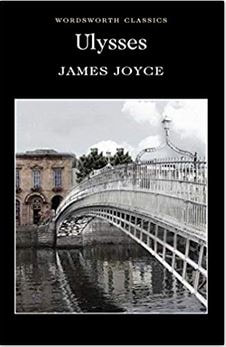
'Ulysses' first appeared in serial form and was then published as a novel in 1922 in Paris. Why France, when Joyce was Irish and the serialisation took place in an American journal? Controversial from the start, the book was banned in Ireland, the United States and Britain because it was considered obscene. As well as sexual imagery, 'Ulysses' includes detailed descriptions of bodily functions such as masturbation, menstruation and defecation. The Parisian publishing house clearly wasn't fazed by such matters. The book recounts the various events which befall Leopold Bloom and Stephen Dedalus in Dublin on 16 June 1904, including Bloom's wife, Molly, committing adultery. Hailed by critics such as T S Eliot yet reviled by others, e.g. Virginia Woolf, the serialised version was the subject of an obscenity trial in the US, leading to the novel being banned in that country. Copies were burned and incoming shipments were seized by customs officials. In the 1930s a US court ruling overturned the obscenity charge, making America the first English-speaking country to allow the book.
What fascinates me is the unusual structure. Joyce divided 'Ulysses' into eighteen chapters called episodes, saying he had "put in so many enigmas and puzzles that it will keep the professors busy for centuries arguing over what I meant". The characters and theme of each episode correspond to those in Homer's 'Odyssey'. Sounds intriguing - another one for my reading list!
What fascinates me is the unusual structure. Joyce divided 'Ulysses' into eighteen chapters called episodes, saying he had "put in so many enigmas and puzzles that it will keep the professors busy for centuries arguing over what I meant". The characters and theme of each episode correspond to those in Homer's 'Odyssey'. Sounds intriguing - another one for my reading list!
3. 'Lady Chatterley's Lover' by D H Lawrence
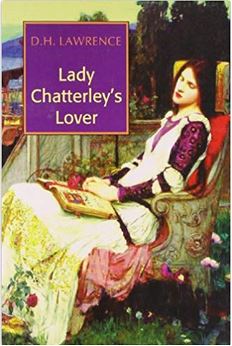
First published in Italy in 1928, the full version of 'Lady Chatterley's Lover' didn't appear in the UK until 1960. Upon its release, the publishers, Penguin Books, were tried under The Obscene Publications Act 1959, making this an important test case for the new law. The book had become notorious for its story of the relationship between two individuals from different social classes, explicit descriptions of sex and profanity. The verdict, a triumph for common sense and literary freedom in my opinion, was a 'not guilty' one. To twenty-first century readers, the book won't deliver the same kind of shock it did in the nineteen twenties. Back then, the sexual content and swearing held far more power to offend, but I suspect the main reason for the disapproval it generated was the story's crossing of class divisions. The book has also been banned and featured in obscenity trials in Australia, America, Japan, India and Canada.
Here's a synopsis: Constance Reid marries Sir Clifford Chatterley, who becomes paralysed from the waist down after the First World War. Desperate for an heir and embarrassed by his inability to satisfy his wife sexually, Clifford gives the go-ahead for her to have an affair, envisaging she will choose someone from their immediate social circle. Instead, Constance begins a passionate relationship with their married gamekeeper, Oliver Mellors, inciting Clifford's ingrained class prejudices. The story ends with Mellors working on a farm, waiting for his divorce, with Connie, now pregnant, living with her sister. The expectation is that, eventually, they will be together.
Here's a synopsis: Constance Reid marries Sir Clifford Chatterley, who becomes paralysed from the waist down after the First World War. Desperate for an heir and embarrassed by his inability to satisfy his wife sexually, Clifford gives the go-ahead for her to have an affair, envisaging she will choose someone from their immediate social circle. Instead, Constance begins a passionate relationship with their married gamekeeper, Oliver Mellors, inciting Clifford's ingrained class prejudices. The story ends with Mellors working on a farm, waiting for his divorce, with Connie, now pregnant, living with her sister. The expectation is that, eventually, they will be together.
4. 'Tropic of Cancer' by Henry Miller
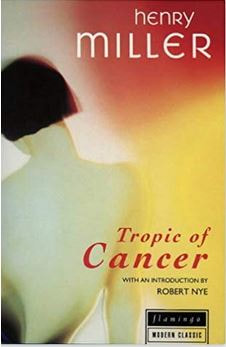
Henry Miller wrote 'Tropic of Cancer' in the early 1930s, and it was originally published in Paris in 1934. The book was banned in the US for more than thirty years because it was considered pornographic. Grove Press published it in America in 1961, leading to more than sixty obscenity trials until (finally!) the Supreme Court ruled it a work of literature in 1964. Other English-speaking countries, such as Canada and the UK, banned 'Tropic of Cancer'. Only smuggled copies of the book were available in the United Kingdom from 1934 onwards. Scotland Yard contemplated banning its publication in Britain in the 1960s, but decided against the move because people like T S Eliot were ready to defend the book publicly. Another victory for literary freedom!
So what was all the fuss about? Set in Paris in the 1930s, the book is largely autobiographical, featuring a starving American writer who lives a bohemian life among prostitutes, pimps, and artists. Meaning lots of sex - oh, the horror! Miller gave the following explanation of the book's unusual title. "To me cancer symbolises the disease of civilisation, the endpoint of the wrong path, the necessity to change course radically, to start completely over from scratch.” Yet another one to add to my reading list!
So what was all the fuss about? Set in Paris in the 1930s, the book is largely autobiographical, featuring a starving American writer who lives a bohemian life among prostitutes, pimps, and artists. Meaning lots of sex - oh, the horror! Miller gave the following explanation of the book's unusual title. "To me cancer symbolises the disease of civilisation, the endpoint of the wrong path, the necessity to change course radically, to start completely over from scratch.” Yet another one to add to my reading list!
5. 'Lolita' by Vladimir Nabokov
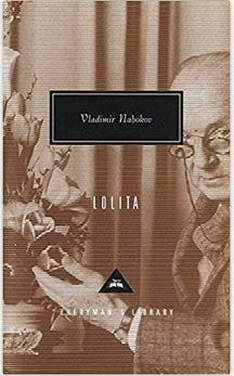
'Lolita' was written in English by its Russian author, Vladimir Nabokov, and first published in Paris in 1955. It seems French attitudes to controversial subjects are more relaxed than those of the US and UK. I can't help noticing how the books I'm featuring in this post often gained acceptance first in Paris. American and English versions followed in 1958 and 1959. The initial reaction was mixed. Graham Greene, in the Sunday Times, called it one of the three best books of 1955, whereas John Gordon, editor of the Sunday Express, dubbed it the filthiest book he had ever read. The Home Office promptly seized all copies entering the UK, and in 1956 France banned 'Lolita' for two years, thus blotting their liberal copybook. The US, however, reacted differently, and the book has never been banned there. A novel about a man who marries a woman so he can embark upon a relationship with her twelve-year-old daughter is bound to be controversial.
The furore rumbles on today; recent sex abuse cases coming to light have ensured the book remains a source of debate. Critics disagree as to whether Lolita was a victim or a willing participant in her sexual relationship with the protagonist Humbert Humbert. Some have interpreted their liaison not as the corruption of an innocent child by a cunning adult, but the exploitation of a weak adult by a corrupt child. Others have labelled Humbert a rapist and paedophile. The book's influence is such that the name Lolita has passed into common usage to describe a sexually provocative young girl.
The furore rumbles on today; recent sex abuse cases coming to light have ensured the book remains a source of debate. Critics disagree as to whether Lolita was a victim or a willing participant in her sexual relationship with the protagonist Humbert Humbert. Some have interpreted their liaison not as the corruption of an innocent child by a cunning adult, but the exploitation of a weak adult by a corrupt child. Others have labelled Humbert a rapist and paedophile. The book's influence is such that the name Lolita has passed into common usage to describe a sexually provocative young girl.
Let's hear from you!
Have you read any of the books I've featured in this post? Do any of them offend you? Or perhaps you consider them victims of outmoded thinking? Leave a comment and let me know!

In this week's post I'd like to examine the stereotype of writers as tortured geniuses. It's a cliché, but one backed up by life. Examples of tormented authors abound; take Sylvia Plath, author of 'The Bell Jar', who was clinically depressed for most of her adult life and committed suicide in 1963. Or Ernest Hemingway, renowned for his hard drinking and womanising, who shot and killed himself. Jack London, Kurt Vonnegut, George Orwell - the list goes on, and it's a long and unhappy one.
A recent study found that, with the exception of bipolar disorder, creative types are no more likely to suffer psychiatric problems than anyone else. Apart from writers, that is. We're more disposed, it seems, towards depression and schizophrenia. More prone to committing suicide, too. Here's the link to an NHS report on the study: Study looks at creativity link with mental illness.
As someone interested in the workings of the brain, I find this fascinating, and frustrating that the study didn't identify possible reasons. I'm fortunate in that I've always enjoyed good mental health; I've blogged before about how I don't use my fiction as a catharsis for my demons, because those pesky little devils are few and far between. I'm aware, though, that other authors are different. Take my writing idol, Stephen King. I can't find the link, but I remember reading that he uses his fiction, especially his earlier works, to resolve childhood issues. He's also a writer who has battled alcoholism and drug addiction. In addition, at least one writer friend uses her books to resolve personal angst.
I suspect certain genres lend themselves as avenues for exploring one's malaise. It's no coincidence that not many emotionally tortured writers have penned light romances or children's books. King's preference for writing horror and supernatural fiction is a great example. My own genre, psychological suspense, certainly lends itself to examining the darker side of life, but (thank God!) the events in my books have never featured in my own experience. If writing is cathartic, though, shouldn't authors be less, not more, prone to mental health issues? Or perhaps, for some people, it helps a little but their issues run deeper than fiction can heal. Who knows?
My conviction is that our minds are far more complex than we can understand, at present anyway. And other creative professions, such as art and music, are by no means exempt - Van Gogh and Nick Drake, anyone? Take a recent study conducted by Help Musicians UK, which found that over 60% of musicians suffer some form of mental health issue. Such problems can affect anyone, at any age, whatever their profession. Despite what the survey found, I'm not sure they're linked to creativity.
What do you think? Leave a comment and let me know!
A recent study found that, with the exception of bipolar disorder, creative types are no more likely to suffer psychiatric problems than anyone else. Apart from writers, that is. We're more disposed, it seems, towards depression and schizophrenia. More prone to committing suicide, too. Here's the link to an NHS report on the study: Study looks at creativity link with mental illness.
As someone interested in the workings of the brain, I find this fascinating, and frustrating that the study didn't identify possible reasons. I'm fortunate in that I've always enjoyed good mental health; I've blogged before about how I don't use my fiction as a catharsis for my demons, because those pesky little devils are few and far between. I'm aware, though, that other authors are different. Take my writing idol, Stephen King. I can't find the link, but I remember reading that he uses his fiction, especially his earlier works, to resolve childhood issues. He's also a writer who has battled alcoholism and drug addiction. In addition, at least one writer friend uses her books to resolve personal angst.
I suspect certain genres lend themselves as avenues for exploring one's malaise. It's no coincidence that not many emotionally tortured writers have penned light romances or children's books. King's preference for writing horror and supernatural fiction is a great example. My own genre, psychological suspense, certainly lends itself to examining the darker side of life, but (thank God!) the events in my books have never featured in my own experience. If writing is cathartic, though, shouldn't authors be less, not more, prone to mental health issues? Or perhaps, for some people, it helps a little but their issues run deeper than fiction can heal. Who knows?
My conviction is that our minds are far more complex than we can understand, at present anyway. And other creative professions, such as art and music, are by no means exempt - Van Gogh and Nick Drake, anyone? Take a recent study conducted by Help Musicians UK, which found that over 60% of musicians suffer some form of mental health issue. Such problems can affect anyone, at any age, whatever their profession. Despite what the survey found, I'm not sure they're linked to creativity.
What do you think? Leave a comment and let me know!
I'm delighted to welcome novelist Patrick Parker, who has written three intriguing novels so far, to my blog. Welcome, Patrick!
Thank you, Maggie, for your time and giving me the opportunity to talk with you.
Thank you, Maggie, for your time and giving me the opportunity to talk with you.
Tell us about yourself and your life to date.
I retired from the US Army, then worked in the defense industry for fifteen years. My duty assignments took me to Italy, Germany, Panama, as well as the United States. My corporate work took me to Europe, across the United States and England. I am now settled in Texas, writing full time. I enjoy scuba diving, sailing, going to the beach, and astronomy.
A challenge issued by your wife led to you writing 'Treasures of the Fourth Reich' - can you elaborate?
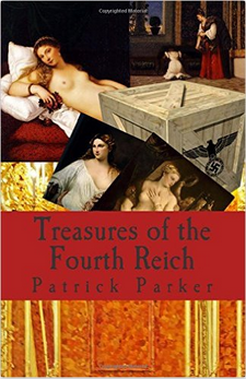
I picked up a suspense book to read on the plane for a trip. This particular book, by one of the large publishing houses, was hyped as a “must read” and had several endorsements. I thought I couldn’t go wrong. However, I found numerous errors and holes in the plot. In some instances, the story line was not believable. When I returned home, in a conversation, my wife asked how I liked the book. I told her about it, and that I was disappointed. I made an offhanded comment that I could write a better book. She said flat out, “Why don’t you?”
Time passed and I began thinking of her comment, but doubt filled my head. A few travel excursions later, I bought another suspense book and it too, disappointed me. Then I was sent to Panama on a classified assignment. I stopped in at an art gallery hoping to buy a painting as a memento. The owner of the shop was active in the resistance against Manuel Noriega and looked to the United States to rescue her country. She told me at length, about the situation in the country. I found her fascinating. My trip to the isthmus did have many tense and exhilarating moments. Soon after I returned, in one conversation, my wife asked me again if I was going to write a book. “It is harder than you think,” she said. I think she was just tired of me complaining of the quality of some books. Her comment was all it took. Panama was still fresh in my head and I thought the art dealer would make a very interesting character in a book. The idea took shape and 'Treasures of the Fourth Reich' was born.
Time passed and I began thinking of her comment, but doubt filled my head. A few travel excursions later, I bought another suspense book and it too, disappointed me. Then I was sent to Panama on a classified assignment. I stopped in at an art gallery hoping to buy a painting as a memento. The owner of the shop was active in the resistance against Manuel Noriega and looked to the United States to rescue her country. She told me at length, about the situation in the country. I found her fascinating. My trip to the isthmus did have many tense and exhilarating moments. Soon after I returned, in one conversation, my wife asked me again if I was going to write a book. “It is harder than you think,” she said. I think she was just tired of me complaining of the quality of some books. Her comment was all it took. Panama was still fresh in my head and I thought the art dealer would make a very interesting character in a book. The idea took shape and 'Treasures of the Fourth Reich' was born.
How far is the character of Maria Conner based on that art dealer you met in Panama?
Maria Conner is based on a real person in Panama. That person, I’ll call her Mary (not her real name), did own an art gallery. Mary was very vocal in her opposition to the Noriega regime. She intrigued me, although it was a bit frightening. Almost immediately, she asked me if I was going to save them. She began to tell me of the atrocities occurring there. She even told me she and a number of others were organized against the government. Her flat out statements were alarming. If we were overheard, I probably wouldn’t be here. Mary is about the same age as Maria Conner and, probably, much the same personality. Mary did have tragedy in her life as well. Yes, I did buy a watercolor painting from her.
From where did you get the inspiration for the character of Dydre Rowyn in 'War Merchant'?
Dydre Rowyn is a combination of several women I knew from my work in the defense industry. I took from their personalities, traits, and background. Usually, the protagonist in a book like War Merchant is male. I thought a female would not only be a better twist but also add to the suspense. I didn’t want to have the usual stereotypical book. I knew it would be a challenge to maintain her femininity and it was. This character had to be smart, cunning, attractive, not cower when faced with danger, and deadly. I have known some female soldiers that were tougher than woodpecker lips. A female is more deadly than a male. So, after all that, Dydre came to life. The excellent reviews and comments on my female protagonist, from women, tell me that I accomplished my goal with her.
Tell us about your latest book, 'Six Minutes Early'.
| 'Six Minutes Early' is a suspense novel involving a drug cartel, which aids ISIS in a plan to attack the heartland of the United States. A former Special Operations officer, forced to resign from the Army, leads the planning and attack. I have captured the current political climate in Washington DC and have used some recent events to make a relevant and believable story. This book is another fast-paced, suspense-filled book that will keep you on the edge of your seat. My writers group keeps telling me they’ll miss me when I’m carted away and placed in the witness protection program. I certainly hope they are wrong and I don’t disappear! |
Your books so far have focused on issues of war. Will you write about other themes and in different genres in the future?
Yes, they have but I don’t want people to think they are war books. I have been asked many times if some of my characters will return in another story. I would like to bring them back and have a few ideas to do just that. For the time being, I think I will stay in the suspense genre. Yes, that is a broad area and one I like and enjoy writing. I may bring a character(s) back for a crime story or mystery. For now, I have several ideas that incorporate politics, history, and current events. There is so much going on in the world now that you can’t make up. It is ripe for storytelling!
How does your writing fit in with your non-writing life?
That is a good question. If you ask my wife, she’ll tell you it infringes too much. I look at it as a full-time job and I am focused on the story at hand. It is time consuming, but if you want a good product, you must devote the time. I do get involved in a story and probably do drive everyone nuts until it is finished. How do you see your writing career progressing?
What are your literary aims and ambitions?
| I plan to continue writing a book about every year or eighteen months. I want to continue growing as a writer, giving my readers quality stories that are believable and keep them on the edge of their seats. My stories are well suited for film and I would love to see them made into movies. I would like to do a series someday. I am focused on the long-term, growing and keeping my readers. So far, the reviews have been great and I am very pleased with the feedback. |
What's been the most joyful part to date of being a novelist?
The most joyful is getting my books published and reading the reviews. My mother, wife, and daughters are very proud of my accomplishments. That in itself is very gratifying. Some of my old friends and classmates are not only astounded that I am published but elated as well. I guess I just surprised everyone.
What are your top three strengths (as a person, not just as a writer)? Your top three weaknesses?
My top three strengths are: I am very tenacious; I have great attention to detail; and I am disciplined. I want to produce quality work. Sometimes my tenaciousness and attention to detail consume too much time. My three weaknesses are: I get impatient at times; I fret too much over the small things, which I have no control over; and incompetence drives me crazy. I do work on these weaknesses and try to keep them in check.
Thanks, Patrick! It's been a pleasure interviewing you.
Wow, those strengths and weaknesses mirror my own! Want to know more about Patrick and his books? Visit his website at http://patrickparkerbooks.wixsite.com/author
Categories
All
Author Interviews
Book Reviews
Let's Discuss!
Sundry
The 'Five' Series
The Writing Process
Subscribe to my blog!
Via Goodreads
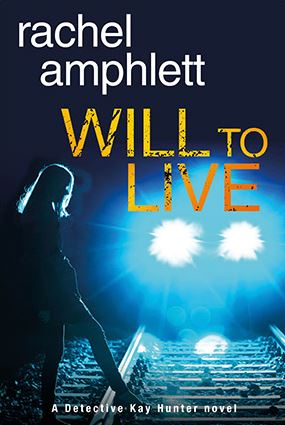
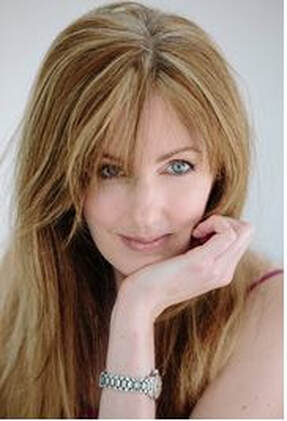
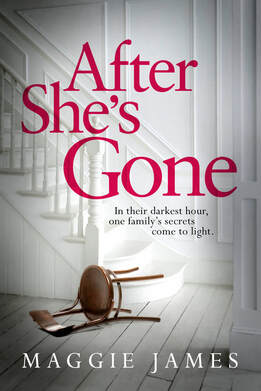
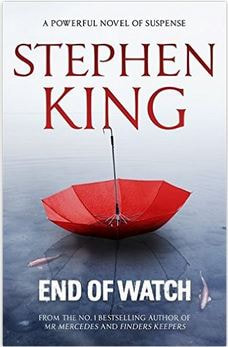
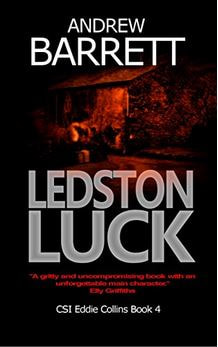
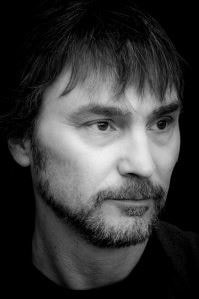
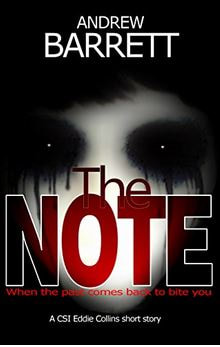


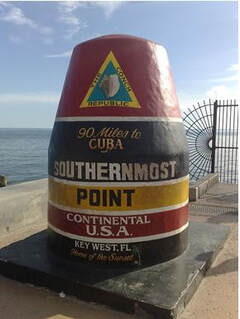

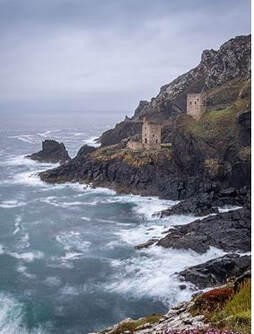
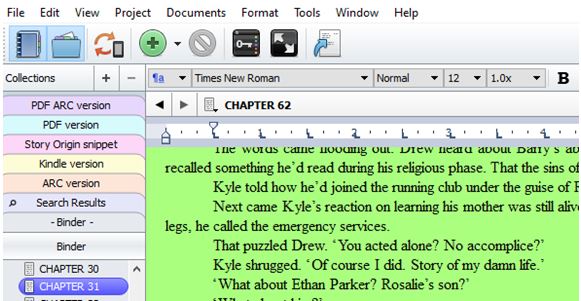
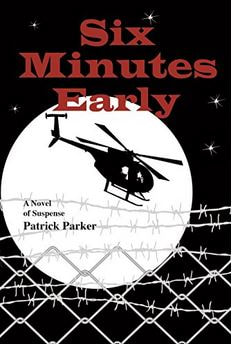
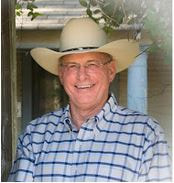
 RSS Feed
RSS Feed
